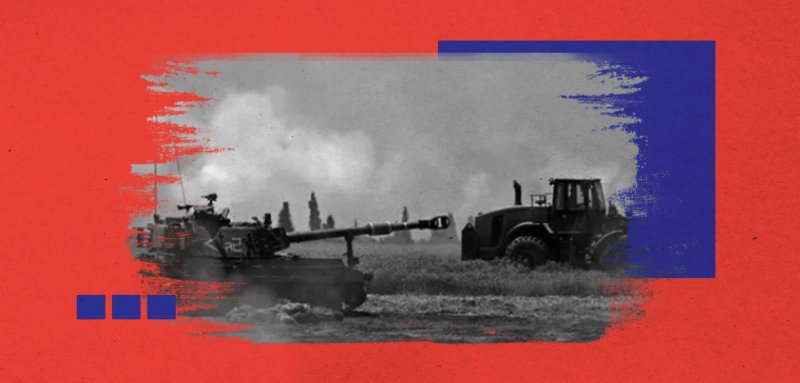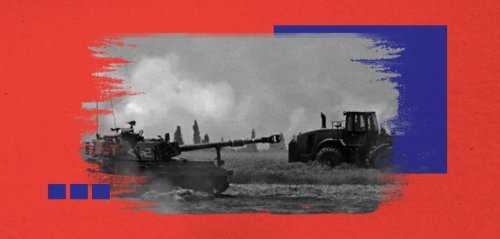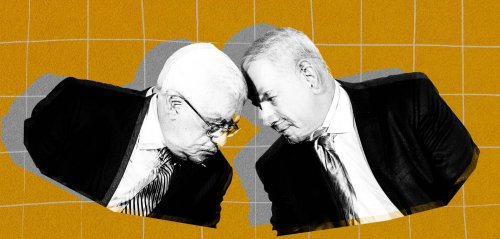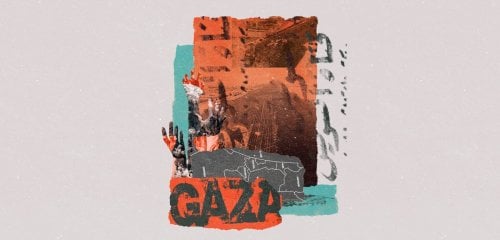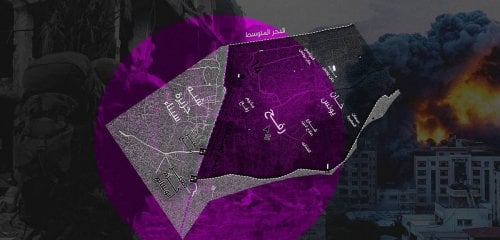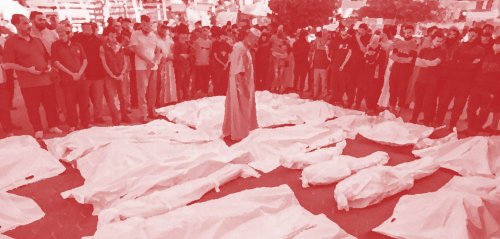The war on Gaza has taken a turn after the Israeli army launched airstrikes on the city of Rafah in the early hours of February 12, raising questions about the ambiguity of the current situation amidst escalating tension between Cairo and Tel Aviv on one hand, and recent attempts to mediate a prisoner exchange deal and reach a ceasefire on the other.
Israel justified the airstrikes on Rafah, which have so far left over a hundred killed and dozens wounded, by claiming to have targeted “terror targets” during a rescue operation for two hostages. Following the operation, Israeli Prime Minister Benjamin Netanyahu reaffirmed continuing the war and entering Rafah, stating that “those who say that under no circumstances should we enter Rafah are basically saying, 'Lose the war. Keep Hamas there’.”
Why Rafah?
In a conversation with Raseef22, Dr. Aql Salah, an expert on ideological movements, stated, “Rafah is a pressure tactic on the Palestinian resistance and on Hamas. Israel has been negotiating for five months and has yet to reach any conclusion, and Rafah is its last card to reduce the demands and conditions of the resistance, especially after Israel received the go-ahead from its ally, Washington.”
Dr. Ayman al-Raqab believes Israel will likely back down from its operation in Rafah if the cost involves a clash with Cairo, because “Tel Aviv realizes the importance of political and strategic relations with Egypt, which outweighs their operation in Rafah”
Palestinian analyst Dr. Ayman al-Raqab regards Netanyahu's insistence on taking the battle to Rafah as an attempt to improve the conditions for negotiating a prisoner exchange, as “he considers it the last stronghold of Hamas, with four Hamas battalions that Israel claims it seeks to destroy in Rafah. The Israeli incitement aims to create pressure for better conditions in the indirect negotiations taking place in Cairo,” adding, “claims of the presence of prisoners and their release provide the added legitimacy that the Israeli government wants as justification for the operation.”
According to Al-Raqab, “this operation has consequences, as the occupation of Rafah has two objectives: first, to displace the civilian population towards Egypt, which enables the occupation to achieve its goal of forced migration and displacement – of course, Egypt strongly rejects this – and second, to force people to move towards the north, before following them, searching them, tightening restrictions on them, and ultimately arresting whoever they want. Rafah is the last stronghold, with areas that have not yet been targeted.”
According to Palestinian analyst Dr. Maher Safi, the significance of Rafah for Israel goes beyond this war. Israel’s goal is “for future economic gain, which includes controlling the natural gas fields in Gaza and constructing the Ben Gurion Canal between the Mediterranean and the Red Sea, connecting Eilat on the Red Sea to Ashkelon on the Mediterranean. This would make it a crucial transport hub, a transshipment point, and a logistical center for the world, creating a real alternative to the Suez Canal which currently handles 12% of global traffic. The complete destruction of Rafah, and by extension Gaza, provides Israel with the means of transportation for its future ambitions.”
Egypt and Qatar are working to bridge their differences in order to reach an agreement for a ceasefire and the release of hostages. However, according to Hamas, the attack in Rafah could jeopardize negotiations for a prisoner exchange.
Will Netanyahu also blow up the peace treaty?
Located in the southernmost tip of the Gaza Strip, Palestinian Rafah is just a few dozen meters away from the Egyptian Rafah, with both areas previously belonging to the same governorate. Today, the Salah al-Din Axis, also known as the Philadelphi Axis, separates Egypt from the Gaza Strip, and the Rafah border crossing separates the two sides of the city.
Cairo considers Palestinian Rafah integral to Egyptian national security, with the Egyptian Ministry of Foreign Affairs expressing reservations about the Israeli operation. In a statement released on February 11, the Ministry labeled Israel's “targeting of Rafah and its ongoing policy of obstructing access to humanitarian aid as an effective contribution to implementing the policy of displacing the Palestinian people and eliminating the Palestinian cause.”
Tensions between Egypt and Israel are currently “escalating”, according to Ambassador Ahmed Abu Zeid, spokesperson for the Egyptian Ministry of Foreign Affairs. Meanwhile, Israeli Finance Minister Tzachi Hanegbi holds Egypt “partially responsible” for Operation Al-Aqsa Storm, a claim rejected by Cairo.
While press reports have quoted Egyptian and Western officials as saying that Egypt has warned Israel that it will freeze the peace agreement if they launch a large-scale operation in Rafah, Cairo publicly maintains a diplomatic tone in order to avoid escalation. Egyptian Foreign Minister Sameh Shoukry reiterated the country’s commitment to a peace agreement.
Dr. Ayman al-Raqab believes that Israel will likely back down from its operation in Rafah if the cost involves a clash with Cairo, because “Tel Aviv realizes the importance of political and strategic relations with Egypt, which outweighs their desired operation in Rafah.”
Dr. al-Raqab believes that Israel is unlikely to be concerned about 'crossing red lines' unless it deems U.S. warnings against harming relations with Egypt to be serious, especially if Israel insists on causing disruption within the region by forcing Gazans into displacement.
Reports suggest that senior Israeli security officials are working around the clock to ease Egypt’s concerns about an imminent Israeli military attack on Rafah, according to the Times of Israel. Israel sent David Barnea, head of the Mossad, to Cairo on Tuesday, February 13th, to engage in discussions on the hostage deal, according to Yedioth Ahronoth. Egypt and Qatar are working to bridge their differences after Hamas's response to the framework agreement in Paris, in order to reach an agreement for a ceasefire and the release of hostages. However, Hamas stated that the attack on Rafah could jeopardize negotiations for a prisoner exchange.
Earlier this week, U.S. President Joe Biden warned Netanyahu that an operation in Rafah could lead to a humanitarian disaster and asked him to devise a plan to protect civilians.
Zvi Yehezkeli, Arab affairs analyst for Israel's Channel 13, believes that the Israeli government missed an opportunity to bomb the Philadelphi Axis at the start of the war, a time “when Israel could have done a lot of things.”
Meir Masri, a professor of political science at the Hebrew University, ruled out the possibility of tensions escalating into a confrontation between Egypt and Israel, speculating that Egyptian reinforcements along the borders were carried out in coordination with Israel and dismissing allegations that Israel has been attempting to forcefully displace Palestinians into Egypt.
Dr. Yehuda Balanga, an expert on Egyptian and Syrian affairs in the Department of Jewish Studies at Bar-Ilan University, stated that Israel should mark its presence by creating its own military reality on the ground in order to avoid a confrontation with Egypt.
According to Dr. Balanga, “Israel's settlement in Gaza concerns Egypt as it represents a return of the Israeli presence to the Gaza Strip, and this is a violation of their agreements. For Egyptians, this is a line they do not wish to cross after all the achievements and agreements. If Israel returns to Gaza, it is considered a failure in their policy.”
Amos Harel, an Israeli writer and analyst believes that Tel Aviv is causing unease in Cairo. As a result, Egypt has positioned dozens of tanks in northeastern Sinai and erected barriers along the Gaza border in Rafah to prevent the forced displacement of Palestinians into Egyptian territory. It has also threatened to suspend the peace agreement and the entry of humanitarian aid into Gaza without any security checks.
What do the Israelis say?
After the bombing of Rafah, many Israeli media outlets praised the operation, while only a few warned of the consequences. One such critic is the left-wing leaning Gideon Levy, who wrote an article in Haaretz titled, All we can do now is to request, beg, cry out: Don't enter Rafah.
Levy wrote, “Invading Rafah will make the army commit a serious crime of genocide that it has already committed before, and this invasion will turn Rafah into a slaughterhouse.” Levy, known for his attacks on Israeli settlement and occupation policies, wrote that Tel Aviv and the Biden administration should wake up, and that Washington should prevent the invasion of Rafah as “it is the only one capable of restraining Israel.”
Zvi Yehezkeli, Arab affairs analyst for Israel’s Channel 13, believes that the Israeli government missed the window to bomb the Philadelphi Axis at the start of the war.
Yehezkeli urged the army and government to launch its military operation in Rafah, stating, “I think Israel should have bombed the Philadelphi Axis at the beginning of the war and taken control of it. They keep saying 'fear of Egypt', 'fear of the world'. Don't forget that in the first weeks of the war, we could have done a lot of things.” Yehezkeli proceeded to attack Egypt for allegedly supporting Hamas despite the dangers it poses and its close links to the Muslim Brotherhood. He asked, “Why doesn't Egypt open its borders to the displaced?”
Omer Dostri, an Israeli researcher specializing in political science, argued, “History proves that Israel cannot rely on a foreign entity for its security. In order to prevent Gaza from becoming a terrorist entity again, Israel must militarily occupy Rafah and, subsequently, the Philadelphi Axis, and control the area even after the war.”
Jacob Nagel, the former head of Israel's National Security Council, downplayed Egypt's threats to suspend the peace agreement, stating that Egypt needs it more than Israel does. According to Nagel, all Egypt can do is reprimand Israel’s, and that the situation would not escalate into war or confrontation. He emphasized the importance of Israel to engage in the war in Rafah.
Raseef22 is a not for profit entity. Our focus is on quality journalism. Every contribution to the NasRaseef membership goes directly towards journalism production. We stand independent, not accepting corporate sponsorships, sponsored content or political funding.
Support our mission to keep Raseef22 available to all readers by clicking here!
Interested in writing with us? Check our pitch process here!
